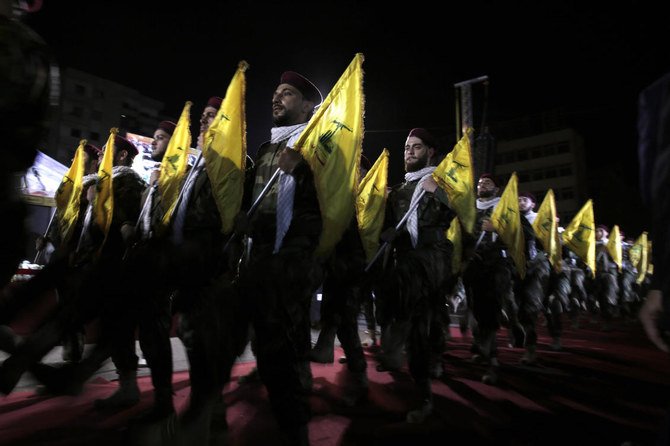Driving back to base after firing rockets toward Israeli positions from a border area last month, a group of Hezbollah fighters was accosted by angry villagers who smashed their vehicles’ windshields and held them up briefly.
It was a rare incident of defiance that suggested many in Lebanon would not tolerate provocations by the powerful group that risk triggering a new war with Israel.
As Lebanon sinks deeper into poverty, many Lebanese are more openly criticizing Iran-backed Hezbollah. They blame the group — along with the ruling class — for the devastating, multiple crises plaguing the country, including a dramatic currency crash and severe shortages in medicine and fuel.
“Hezbollah is facing its most consequential challenge in maintaining control over the Lebanese system and what is called the ‘protective environment of the resistance’ against Israel,” said Joe Macaron, a Washington-based Middle East analyst.
The incident along the border and other confrontations — including a deadly shooting at the funeral of a Hezbollah fighter and rare indirect criticism by the country’s top Christian religious leader — have left the group on the defensive.
The anger has spread in recent months, even in Hezbollah strongholds where many have protested electricity cuts and fuel shortages as well as the currency crash that has plunged more than half the country’s 6 million people into penury.
In its strongholds, predominantly inhabited by Shiite Muslims, it is not uncommon now for people to speak out against the group. They note that Hezbollah is paying salaries in US dollars at a time when most Lebanese get paid in Lebanese currency, which has lost more than 90 percent of its value in nearly two years.
Protests and scuffles have broken out at gas stations around Lebanon and in some Hezbollah strongholds. In rare shows of defiance, groups of protesters have also closed key roads in those areas south of Beirut and in southern Lebanon.
In recent speeches, Hezbollah leader Sayyed Hassan Nasrallah has appeared angry, blaming the shortages on what he describes as an undeclared Western siege. The chaos in Lebanon, he said, is being instigated from a “black room” inside the US Embassy.
Critics say that rather than push for reform, Hezbollah has stood by its political allies who resist change. They say the group is increasingly pulling Lebanon into Iran’s orbit by doing its bidding, and that US sanctions against Iran and Hezbollah have made things harder.
Where Hezbollah was once considered an almost sacred, untouchable force fighting for a noble cause — the fight against the Israeli enemy — it is now seen by many simply as part of the corrupt political clique responsible for the country’s epic meltdown. Still, when it comes to fighting Israel, the group enjoys unwavering backing within its base of support.
Often criticized for operating as a state within a state, Hezbollah has tried to ease the effects of the crisis on its supporters in similar fashion.
While the government has been working for months to issue ration cards to poor families, Hezbollah has been well ahead. It has issued two such cards to poor families living in Hezbollah bastions, one called Sajjad after the name of a Shiite imam, and a second called Nour, or light, for its fighters and employees of its institutions who number about 80,000.
“We will serve you with our eyelashes,” is Hezbollah’s slogan to serve the extremely poor in its communities — a Lebanese term meaning they are ready to sacrifice anything to help others.
The tens of thousands carrying Sajjad cards not only can buy highly subsidized products from dozens of shops spread around Lebanon — mostly staples made in Lebanon, Iran and Syria — but can also get medical treatment and advice at 48 Hezbollah-run clinics around Lebanon.
Nasrallah is also organizing a sea corridor carrying oil from Iran to Lebanon to help alleviate the fuel shortages, with the first tanker believed to be on its way. The move has been praised by Hezbollah’s supporters and heavily criticized by its opponents, who say it risks bringing more sanctions on Lebanon.
In the border incident, villagers from the minority Druze sect intercepted Hezbollah fighters on their way back after firing rockets toward a disputed area held by Israel. The villagers briefly detained them and the mobile rocket launcher they used after accusing them of putting them at risk if Israel strikes back.
The fighters and the launcher were then handed over to Lebanese troops, who released them on the same day.
Later, Hezbollah angered many Christians after supporters launched a social media campaign against the head of Lebanon’s Maronite Catholic church, the country’s largest, accusing him of treason after he criticized the group for firing the rockets on Israeli positions.
The widely feared group has been hammered by accusations from its local opponents. They include silencing its opponents, facilitating

